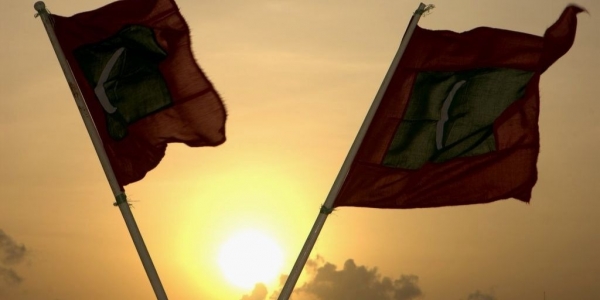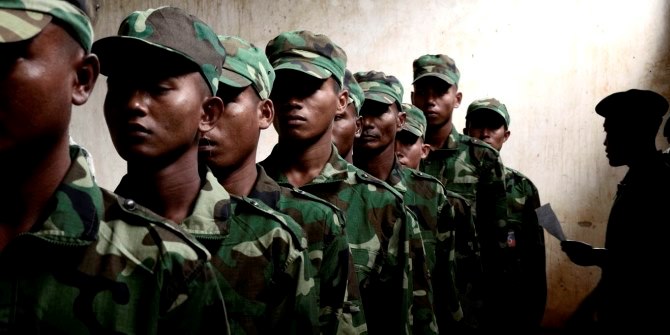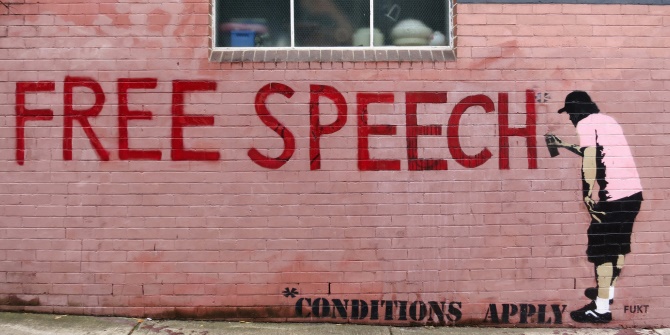 The current crisis in the Maldives can be seen as an opportunity for India to regain its lost influence in the country, and subsequently in the region. Although challenges are far greater than opportunities writes Sarral Sharma.
The current crisis in the Maldives can be seen as an opportunity for India to regain its lost influence in the country, and subsequently in the region. Although challenges are far greater than opportunities writes Sarral Sharma.
Despite outpouring domestic and international pressure, the Abdulla Yameen government on 20 February approved a 30-day extension of the state of emergency in the Maldives. President Yameen has not budged under growing domestic politico-economic concerns and possible diplomatic alienation from the international community. His authoritarian posturing continues while the opposition legislators defy security restrictions to protest against hisruling. Former Maldivian leaders have called for intervention from India, and other countries, to restore democratic system in the country. However, with the apparent Chinese-backing and the local support to Yameen, India would preferably use diplomatic means, over coercive actions, to express its “deep” dismay over the emerging political crisis in the Maldives. New Delhi would try to avoid a confrontation with the Yameen government, which seems unlikely in the coming months.
So far, the Indian opinion remains divided on what role should it play in the island country to safeguard its strategic interests in the Indian Ocean region. Persistent diplomatic pressure over a possible military intervention remains New Delhi’s policy approach under the given circumstances. Also, India would require both domestic (in the Maldives) support and international backing before taking any coercive action. Moreover, it would be bit naive to compare India’s military intervention in 1988 with the current political crisis in the Maldives. This time the aggressor is the authoritarian regime of President Yameen, an insider. Whereas, in 1988, the Maldivian government faced an external aggressor, and India’s intervention had the local support. Still, New Delhi’s policy might change as the situation evolves in the island country. Thwarting China’s growing influence and placing a pro-India government may remain New Delhi’s topmost priority in the Maldives.

It is possible that the Yameen government has abandoned the “India first” policy over a more China focussed one. Male’s priorities should not startle India as the current dispensation has, since the beginning, shown averseness to the latter’s role in the island country. Not surprisingly, Indian Prime Minister Narendra Modi has not visited the Maldives. Whereas Chinese President Xi Jing ping made the visit in 2014.
Moreover, New Delhi seems concerned about its fast losing influence over South Asian Association of Regional Cooperation (SAARC) countries. China’s growing economic clout in South Asia has fostered this fear. Despite India’s deep historical ties with the member countries, it appears Beijing’s increasing economic influence has shifted the balance of power in the region. Nepal, the Maldives, SriLanka and to an extent even Bangladesh are getting into the Chinese grip. Therefore, it is indispensable for India to take measures to keep its interests intact in South Asia.
The current crisis in the Maldives can be seen as an opportunity for India to regain its lost influence in the country, and subsequently in the region. Although challenges are far greater than opportunities. A politically unstable Maldives could also prove to be a major security challenge for India. There are already fertile grounds for religious fundamentalism in the country by taking into account the number of local Maldivians travelled to Syria to join the ISIL(some reports suggest around 200 Maldivians joined the ranks of the group).Other crimes such as drug trafficking, piracy and smuggling may also add to India’s insecurity. Additionally, the persistent political churn in the island nation, after the first democratic elections in 2009 and the overthrew of the former President Mohammed Nasheed’s government in a coup in 2012, remains a concern for India.
On the other hand, China has rapidly expanded its deep footprint in the Maldives, even though it opened the embassy only in 2011. The Indian Ocean archipelago officially joined China’s Maritime Silk Road initiative last year and signed a Free Trade Agreement(FTA) in December despite the opposition’s disapproval. Interestingly, the 1,000-page document of the agreement was pushed through the Maldivian parliament without any discussion. It reflects Yameen’s keenness to embolden relations with Beijing at any cost, and inadvertently (or even knowingly) jeopardising ties with India. China is investing on various infrastructure projects such as the famous Maldives-China Friendship bridge linking Male to Hulhule Island or a 1,000-apartment housing project. No wonder, China also accounts for most tourists visiting the Maldives.
But, all is not lost for India as it still holds good ties with the Maldivian opposition leaders and is apparently on the same page with countries such the United States, the United Kingdom, among others on the current political developments. More importantly, Yameen has started to feel heat from within after two of his ministers resigned since the announcement of the emergency. Although Yameen has finally removed the 45-day long emergency on 22 March, he may continue to face backclash from the opposition leaders, rights activists and affected local population. The country’s economy has been hit substantially amid growing instability in the tourism industry — roughly contributes more than quarter of the Maldives’ Gross Domestic Product (GDP), generating 70 per cent of the countries forex earnings and accounting for 30 per cent of the Government revenues — due to the ongoing political crisis. It may take long time for it to recover fully. On the other hand, affected locals continue to use social media tools to call for external support against the Yameen government’s autocratic ruling. Amid growing discontent in the Maldives, New Delhi may consider upping the ante against Yameen.
For now, the Modi government may avoid taking coercive actions such as imposing economic sanctions or restricting trade of essential commodities which could prove counter-productive and might fuel long-term antagonism against India in the Maldives. Nepal’s antagonistic behaviour towards India, after the trade blockade over the Madhesi issue in 2016, serves as a recent example of possible strategic repercussions of any such attempt. Furthermore, Yameen may possibly cash in on the opportunity, if India provides it, to win votes in the upcoming presidential election (if it takes place on time).
But there are signs of growing concern amongst locals against burgeoning Chinese investments in the Maldives. The recent “sell-out” of Sri Lanka’s Hambantota port to China on a 99-year lease under Beijing’s famous “debt-trap diplomacy” and rumours of naval base in the country might have added to insecurity among Maldivians. Still those concerns have not yet materialised into an outright opposition against China. Moreover, Beijing is aware that the Yameen government is the best bet for them in the long-run and vice-versa. Whereas, New Delhi is possibly looking for a regime change in the Maldives. Therefore, it is handling the matter through diplomacy and avoiding any interventionist approach to circumvent the tag of an”intruder” country.
This article gives the views of the authors, and not the position of the South Asia @ LSE blog, nor of the London School of Economics. Please read our comments policy before posting.
About The Author
 Sarral Sharma is a researcher at the Centre for Internal and Regional Security (IReS) programme, Institute of Peace and Conflict Studies (IPCS), a New Delhi-based think tank. His research areas include political and armed conflicts in South Asia, India and Pakistan relations, India’s internal security threats, and radicalisation propaganda in India. He holds an M.Phil degree in English Literature from the University of Delhi. He is also a member of the Delhi team of Aaghaz-e-Dosti (Beginning of Friendship), an India-Pakistan conflict resolution and peace building initiative. He tweets @sarral_sharma
Sarral Sharma is a researcher at the Centre for Internal and Regional Security (IReS) programme, Institute of Peace and Conflict Studies (IPCS), a New Delhi-based think tank. His research areas include political and armed conflicts in South Asia, India and Pakistan relations, India’s internal security threats, and radicalisation propaganda in India. He holds an M.Phil degree in English Literature from the University of Delhi. He is also a member of the Delhi team of Aaghaz-e-Dosti (Beginning of Friendship), an India-Pakistan conflict resolution and peace building initiative. He tweets @sarral_sharma







